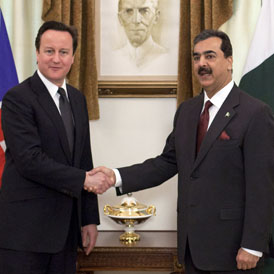Cameron’s £650m aid package for Pakistan
As the Prime Minister travels to Islamabad to announce £650million to help support Pakistan’s education system, Samira Ahmed looks at the political and security implications of the announcement.

The Prime Minister’s visit to Pakistan has been functional with little apparent pre-briefing, but it could be one of the most important foreign policy decisions the Coalition Government makes and contains evidence of a major rethink in strategy towards the increasingly troubled Commonwealth nation.
Just months after causing huge anger in Islamabad when he accused Pakistan – while on a visit to their historical enemy India – of “looking both ways” on terrorism, David Cameron – speaking next to Prime Minister Yusuf Raza Gilani – announced £650 million in aid, targetting education in a country where corruption and poverty have entrenched illiteracy and religious fundamentalism for millions (17 million children are not in school) and encouraged thousands to migrate legally and illegally to Britain – in search of a better life.
Fresh start
In what’s being regarded as a “fresh start” with the notoriously-sensitive Islamabad government, Mr Cameron told his audience in Pakistan that the money would be spent on training 90,000 teachers, building or refurbishing 8,000 schools and providing 6million text books.
He acknowledged the terrible price paid by ordinary Pakistanis in their own battle against terrorism, with 3,000 civilians killed in the past year.
“Few countries have suffered at the hands of this terrorism like yours – as we saw again this weekend, with the cowardly attack which murdered dozens of innocent people at the Sakhi Sarwar shrine,” he said.
The Prime Minster said he’d have trouble justifying the spending to the British people at a time of domestic economic hardship and urged Pakistan to deal with its endemic corruption: “Too few people pay tax. Too many of your richest people are getting away without paying much tax at all.”
More importantly perhaps, for British interests, the religious schools or madrassas – often the only education on offer – have again and again proved staging posts for the radicalisation of young British Muslims and been linked together with jihadist training camps, to a number of successful and aborted terrorist plots, including the July 7 London bombings, the 2007 plot to bring down transatlantic airliners with liquid explosives and the 2004 fertiliser bomb plot targetting London night clubs and shopping centres, uncovered by Operation Crevice.
I was in the Old Bailey when one of the would-be bombers – Omar Khyam – testifed about the widespread awareness and support in his British Pakistani community for jihadist military training camps, which he said were supported by Pakistan’s military intelligence service, the ISI.
It could be regarded as a very smart re-focussing of priorities at a time of heavy spending cuts.
Critics of the British Government’s re-allocation of its DfID budget have accused No 10 of fighting domestic anti-terrorist battles under the guise of development aid.
Certainly this £650million fund is an interestingly-timed programme, just months after the Coalition announced it was reviewing and essentially scrapping large parts of Prevent – Labour’s controversial Home Office strategy to tackle home-grown Islamic radicalisation.
But it could be regarded as a very smart re-focussing of priorities at a time of heavy spending cuts.
Like Prevent, the focus of the new Pakistani aid is on education and long-term social benefits. It will be hard to quantify – not least because it’s notoriously difficult to measure success by absence – the absence of terrorist attacks.
But by giving Islamabad hard cash in return for cooperation from the ISI, and setting targets for good governance, could the Coalition Government have come up with a strategy that will require action and deliver measurable results?